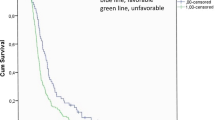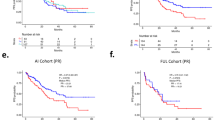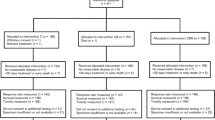Abstract
So far, no reliable predictive clinicopathological markers of response to aromatase inhibitors (AIs) have been identified, and little is known regarding the role played by host genetics. To identify constitutive predictive markers, an array-based association study was performed in a cohort of 55 elderly hormone-dependent breast cancer (BC) patients treated with third-generation AIs. The array used in this study interrogates variants in 225 drug metabolism and disposition genes with documented functional significance. Six variants emerged as associated with response to AIs: three located in ABCG1, UGT2A1, SLCO3A1 with a good response, two in SLCO3A1 and one in ABCC4 with a poor response. Variants in the AI target CYP19A1 resulted associated with a favourable response only as haplotype; haplotypes with increased response association were also detected for ABCG1 and SLCO3A1. These results highlight the relevance of host genetics in the response to AIs and represent a first step toward precision medicine for elderly BC patients.
This is a preview of subscription content, access via your institution
Access options
Similar content being viewed by others
References
Keen JC, Davidson NE . The biology of breast carcinoma. Cancer 2003; 97 (Suppl): 825–833.
Riemsma R, Forbes CA, Kessels A, Lykopoulos K, Amonkar MM, Rea DW et al. Systematic review of aromatase inhibitors in the first-line treatment for hormone sensitive advanced or metastatic breast cancer. Breast Cancer Res Treat 2010; 123: 9–24.
Mouridsen H, Gershanovich M, Sun Y, Pérez-Carrión R, Boni C, Monnier A et al. Superior efficacy of letrozole versus tamoxifen as first-line therapy for postmenopausal women with advanced breast cancer: results of a phase III study of the International Letrozole Breast Cancer Group. J Clin Oncol 2001; 19: 2596–2606.
Paridaens R, Dirix L, Lohrisch C, Beex L, Nooij M, Cameron D et al. Mature results of a randomized phase II multicenter study of exemestane versus tamoxifen as first-line hormone therapy for postmenopausal women with metastatic breast cancer. Ann Oncol 2003; 14: 1391–1398.
Bonneterre J, Buzdar A, Nabholtz JM, Robertson JF, Thürlimann B, von Euler M et al. Anastrozole is superior to tamoxifen as first-line therapy in hormone receptor positive advanced breast carcinoma. Cancer 2001; 92: 2247–2258.
Crivellari D, Sun Z, Coates AS, Price KN, Thürlimann B, Mouridsen H et al. Letrozole compared with tamoxifen for elderly patients with endocrine-responsive early breast cancer: the BIG 1-98 trial. J Clin Oncol 2008; 26: 1972–1979.
Dowsett M, Dunbier AK . Emerging biomarkers and new understanding of traditional markers in personalized therapy for breast cancer. Clin Cancer Res 2008; 14: 8019–8026.
Ellis MJ, Miller WR, Tao Y, Evans DB, Chaudri Ross HA, Miki Y et al. Aromatase expression and outcomes in the P024 neoadjuvant endocrine therapy trial. Breast Cancer Res Treat 2009; 116: 371–378.
Colomer R, Monzo M, Tusquets I, Rifa J, Baena JM, Barnadas A et al. A single-nucleotide polymorphism in the aromatase gene is associated with the efficacy of the aromatase inhibitor letrozole in advanced breast carcinoma. Clin Cancer Res 2008; 14: 811–816.
Park IH, Lee YS, Lee KS, Kim SY, Hong SH, Jeong J et al. Single nucleotide polymorphisms of CYP19A1 predict clinical outcomes and adverse events associated with letrozole in patients with metastatic breast cancer. Cancer Chemother Pharmacol 2011; 68: 1263–1271.
Garcia-Casado Z, Guerrero-Zotano A, Llombart-Cussac A, Calatrava A, Fernandez-Serra A, Ruiz-Simon A et al. A polymorphism at the 3'-UTR region of the aromatase gene defines a subgroup of postmenopausal breast cancer patients with poor response to neoadjuvant letrozole. BMC Cancer 2010; 10: 36.
Wang L, Ellsworth KA, Moon I, Pelleymounter LL, Eckloff BW, Martin YN et al. Functional genetic polymorphisms in the aromatase gene CYP19 vary the response of breast cancer patients to neoadjuvant therapy with aromatase inhibitors. Cancer Res 2010; 70: 319–328.
Ferraldeschi R, Arnedos M, Hadfield KD, A'Hern R, Drury S, Wardley A et al. Polymorphisms of CYP19A1 and response to aromatase inhibitors in metastatic breast cancer patients. Breast Cancer Res Treat 2012; 133: 1191–1198.
Leyland-Jones B, Gray KP, Abramovitz M, Bouzyk M, Young B, Long B et al. CYP19A1 polymorphisms and clinical outcomes in postmenopausal women with hormone receptor-positive breast cancer in the BIG 1-98 trial. Breast Cancer Res Treat 2015; 151: 373–384.
Turkistani A, Marsh S . Pharmacogenomics of third-generation aromatase inhibitors. Expert Opin Pharmacother 2012; 13: 1299–1307.
Hadfield KD, Newman WG . Pharmacogenetics of aromatase inhibitors. Pharmacogenomics 2012; 13: 699–707.
Desta Z, Kreutz Y, Nguyen AT, Li L, Skaar T, Kamdem LK et al. Plasma letrozole concentrations in postmenopausal women with breast cancer are associated with CYP2A6 genetic variants, body mass index, and age. Clin Pharmacol Ther 2011; 90: 693–700.
Guzzi PH, Agapito G, Di Martino MT, Arbitrio M, Tassone P, Tagliaferri P et al. DMET-analyzer: automatic analysis of Affymetrix DMET data. BMC Bioinform 2012; 13: 258.
Solé X, Guinó E, Valls J, Iniesta R, Moreno V . SNPStats: a web tool for the analysis of association studies. Bioinformatics 2006; 22: 1928–1929.
Menashe I, Rosenberg PS, Chen BE . PGA: power calculator for case–control genetic association analyses. BMC Genet 2008; 9: 36.
Gibson L, Lawrence D, Dawson C, Bliss J . Aromatase inhibitors for treatment of advanced breast cancer in postmenopausal women. Cochrane Database Syst Rev 2009; 4: CD003370.
Masi L, Becherini L, Gennari L, Amedei A, Colli E, Falchetti A et al. Polymorphism of the aromatase gene in postmenopausal Italian women: distribution and correlation with bone mass and fracture risk. J Clin Endocrinol Metab 2001; 86: 2263–2269.
Ma CX, Adjei AA, Salavaggione OE, Coronel J, Pelleymounter L, Wang L et al. Human aromatase: gene resequencing and functional genomics. Cancer Res 2005; 65: 11071–11082.
Liu L, Bai YX, Zhou JH, Sun XW, Sui H, Zhang WJ et al. A polymorphism at the 3'-UTR region of the aromatase gene is associated with the efficacy of the aromatase inhibitor, anastrozole, in metastatic breast carcinoma. Int J Mol Sci 2013; 14: 18973–18988.
Moy B, Tu D, Pater JL, Ingle JN, Shepherd LE, Whelan TJ et al. Clinical outcomes of ethnic minority women in MA.17: a trial of letrozole after 5 years of tamoxifen in postmenopausal women with early stage breast cancer. Ann Oncol 2006; 17: 1637–1643.
Acknowledgements
This work was supported by Italian Ministry of Health (Grant No. GR-2009-1606663), Veneto Region (Ricerca Sanitaria Finalizzata, Grant No. 317/10), Associazione Italiana per la Ricerca sul Cancro (AIRC, Ref. 14032)), MIUR 60% grant, IOV-IRCCS 5x1000 donation. This work was presented as a poster at the 2014 ASCO Annual Meeting (J Clin Oncol 2014; 32 (Suppl): 5s (abstract 11058)), and at the 23rd Biennial Congress of the European Association for Cancer Research (European Journal of Cancer 20154; 50 (Suppl 5): xxxiv–xxxv). ER was supported by IOV-IRCCS 5X1000 donation.
Author information
Authors and Affiliations
Corresponding author
Ethics declarations
Competing interests
The authors declare no conflict of interest.
Additional information
Supplementary Information accompanies the paper on the The Pharmacogenomics Journal website
Supplementary information
Rights and permissions
About this article
Cite this article
Rumiato, E., Brunello, A., Ahcene-Djaballah, S. et al. Predictive markers in elderly patients with estrogen receptor-positive breast cancer treated with aromatase inhibitors: an array-based pharmacogenetic study. Pharmacogenomics J 16, 525–529 (2016). https://doi.org/10.1038/tpj.2015.73
Received:
Revised:
Accepted:
Published:
Issue Date:
DOI: https://doi.org/10.1038/tpj.2015.73
This article is cited by
-
The plasma peptides of breast versus ovarian cancer
Clinical Proteomics (2019)



